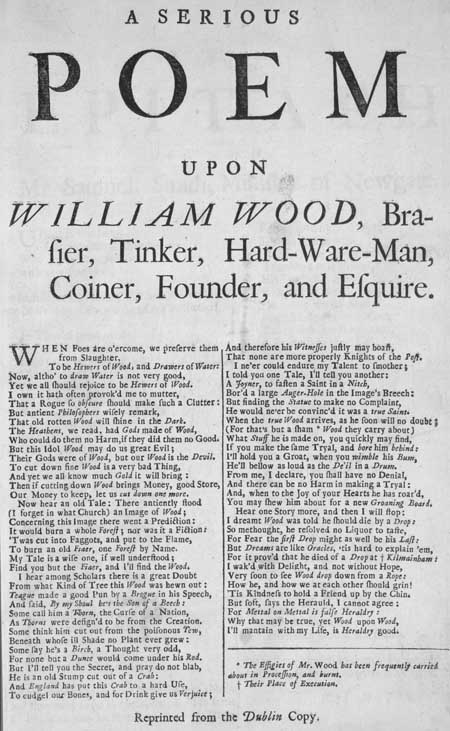Transcription
A SERIOUS POEM UPON WILLIAM WOOD, Bra- sier, Tinker, Hard-Ware-Man,
Coiner, Founder, and Esquire. WHEN Foes are o'ercome, we preserve them
from Slaughter,
To be Hewers of Wood, and Drawers of Water:
Now, altho" to draw Water is not very good,
Yet we all should rejoice to be Hewers of Wood..
I own it hath often provok'd me to mutter,
That a Rogue so obscure should make such a Clutter:
But antient philosophers wisely remark,
That old rotten Wood will shine in the Dark.
The Heathens, we read, had Gods made of Wood,
Who could do them no Harm,if they did them no Good.
But this Idol Wood may do us great Evil;
Their Gods were of Wood, but our Wood is the Devil.
To cut down fine Wood is a very bad Thing,
And yet we all know much Gold it will bring :
Then if cutting down Wood brings Money, good Store,
Our Money to keep, let us cut down one more. Now hear an old Tale: There antiently stood
(I forget in what Church) an Image of Wood;
Concerning this Image there went a Prediction:
It would burn a whole Forest; nor was it a Fiction:
'I was cut into Faggots, and put to the Flame,
To burn an old Fiaer, one Forest by Name.
My Tale is a wife one, if well understood;
Find you but the Fiaer, and I'll find the Wood, I hear among Scholars there is a great Doubt
From what Kind of Tree this Wood was hewn out:
Teague made a good Fun by a Brogue in his Speech,
And said, By my Shoul he's the Son of a Beech :
Some call him a Thorn, theCurse of a Nation,
As Thorns were design'd to be from the Creation.
Some think him cut out from the poisonous Tew,
Beneath whose ill Shade no Plant ever grew:
Some say he's a Birch, a Thought very odd,
For none but a Dunce would come under his Rod.
But I'll tell you the Secret, and pray do not blab,
He is an old Stump cut out of a Crab:
And England, has put this Crab to a hard Use,
To cudgel our Bones, and for Drink give us Verjuice ; And therefore his Witnesses justly may boast, That none are more properly Knights of the Post, I ne'er could endure my Talent to smother;
I told you one Tale, I'll tell you another:
A Joyner, to fasten a Saint in a Nitch,
Bor'd a large Auger-Hole in the Image's Breech:
But finding the Statue to make no Complaint,
He would ne'er be convinc'd it was a true Saint.
When the true Wood arrives, as he soon will no doubt ;
(For that's but a sham * Wood they carry about)
What Stuff he is made on, you quickly may find,
If you make the same Tryal, and bore him behind:
I'll hold you a Groat, when you wimble his Bum,
He'll bellow as loud as the De'il in a Drum.
From me, I declare, you shall have no Denial,
And there can be no Harm in making a Tryal:
And, when to the Joy of your Hearts he has roar'd,
You may shew him about for a new Groaning Board. Hear one Story more, and then I will stop:
I dreamt Wood, was told he should die by a Drop:
So methought, he resolved no Liquor to taste,
For Fear the first Drop might as well be his Last:
But Dreams are like Oracles, 'tis hard to explain 'em,
For it prov'd that he died of a Drop at ? Kilmainham:
I wak'd with Delight, and not without Hope,
Very soon to see Wood drop down from a Rope:
How he, and how we at each other should grin!
'Tis Kindness to hold a Friend up by the Chin.
But soft, says the Herauld, I cannot agree :
For Mettal on Mettal is false Heraldry :
Why that may be true, yet Wood upon Wood,
I'll mantain with my Life, is Heraldry good. * The Effigies of Mr. Wood has been frequently carried
about in Procession, and burnt.
? Their Place of Execution. Reprinted from the Dublin Copy.
View Commentary | Download PDF Facsimile
|
 |
Date of publication:
1724 shelfmark: Ry.III.c.36(149)
 View larger image
View larger image
|


